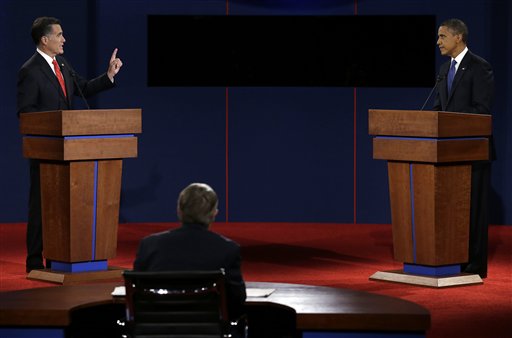Although both parties had been strategically lowering the expectations for their candidate’s debate performance, much anticipation surrounded the first faceoff between President Barack Obama and former Massachusetts governor Mitt Romney at the first of three presidential debates on Wednesday night at the University of Denver, Colorado.
The 90-minute debate, moderated by PBS’ Jim Lehrer, was, as expected, not packed with dramatic moments, attack lines,or zingers. However, perhaps the most memorable and unexpected moment would have to be Romney’s “Big Bird” remark. In response to how he’d handle the deficit, he said he would cut spending on programs, such as PBS and Obamacare, that do not pass the test of being “critical that it’s worth borrowing from China to pay for [them].”
“I’m sorry, Jim, I’m going to stop the subsidy to PBS,” he said to Lehrer. “I like PBS. I love Big Bird. I actually like you, too. But I’m not going to keep spending money on things, borrowing money from China to pay for it.”
As Romney’s remark went viral on social media, as he chose to specifically mention his intention to stop funding for PBS and then quickly announced his love for Big Bird (and Jim Lehrer). Perhaps they were scripted lines designed to be delivered with as unstudied an air as possible, a stratagem to humanize the image of a distant and stiff Romney by adding some lightness to his argument. However, the reasons for his “Big Bird” remark going viral were not so much for its hilarity as for its awkwardness and the quick transition back to his main points about cutting spendings.
The candidates’ performance Wednesday night underscored the differences between the two visions for the country as well as the candidates’ personalities.
The Obama campaign announced prior to the debate that the president will be “speaking directly to the American people, and what they want to hear is what his plan is for moving the country forward.”
And he did just that. Looking straight at the camera, Obama argued against Romney’s plan to reduce the deficit with tax cuts with “math, common sense, and history”:
“The fact is that if you are lowering the rates the way you described, Governor, then it is not possible to come up with enough deductions and loopholes that only affect high-income individuals to avoid either raising the deficit or burdening the middle class. It’s — it’s math. It’s arithmetic.”
He also used history to his advantage, claiming that Romney plans to go back to the Bush policies-“We tried this,” said Obama- while he champions doing what Clinton tried to do.
“I have said that for incomes over $250,000 a year, that we should go back to the rates that we had when Bill Clinton was president, when we created 23 million new jobs, went from deficit to surplus, and created a whole lot of millionaires to boot,” added Obama.
Though Romney was eager – perhaps a little too eager- to “get the last word”(and actually saying so to the moderator was not a good move either), Romney passed on the opportunity to defend himself and to establish the distance between him and the Bush Administration. Not known for his agility, Romney opted for rehearsed answers to reduce the deficit: cutting spending, strengthening the economy, and tax “relief,” as opposed to tax cuts.
Both candidates faced the challenge of attacking their opponent without coming off with too hostility.
When came time for the topic of entitlement, the big elephant in the room was the possibility Romney may be challenged by Obama to address recent surfacing of his 47-percent comment, a remark Romney made at a fundraising party which said 47 percent of America is dependent upon the government.
However, Obama turned to criticize Romney and Vice Presidential candidate Paul Ryan’s plan to turn medicare into a voucher program, which would benefit private insurance companies and not the people who are in need of medical assistance.
Romney’s rebuttal to Obama’s argument- people should have the right to choose their own insurance -is central the direction of Romney’s vision for America. He believed in the devolution of powers back to the states, such as the power to manage Mediaid.
“ [Americans] believe in maintaining for individuals the right to pursue their dreams and not to have the government substitute itself for the rights of free individuals. And what we’re seeing right now is, in my view, a — a trickle-down government approach, which has government thinking it can do a better job than free people pursuing their dreams. And it’s not working,” explained Romney.
“Private market and individual responsibility always work best,” he added.
On the other hand, Obama’s America is where “everybody’s getting a fair shot…everybody’s getting a fair share — everybody’s doing a fair share, and everybody’s playing by the same rules,” he explained in his rebuttal.
Overall, both candidates came out strong from the first debate. They went in the debate fully prepped and carried out what they sought to do – delineate as clear a choice as possible for voters next month. Despite speculations that Obama was a rusty debator, Obama delivered his message clearly; he appeared composed, and confident, compared to Romney who seemed, as many challengers would be, very eager to get his prepared points across. The eagerness of both candidates made it difficult for Lehrer to moderate the debate, but their spirit manifested through their responses should be a good indicator that the upcoming debates will be worth watching.
The complete Presidential Debate can be seen here.


Ed • Oct 5, 2012 at 1:27 pm
That’s not the debate I watched. In the end, Obama looked like a deer in the headlights. Please use your spelling and grammer check.
Mary • Oct 8, 2012 at 9:40 pm
Ed, it’s an opinion piece so it’s going to be subjective. Please learn how to spell grammar.